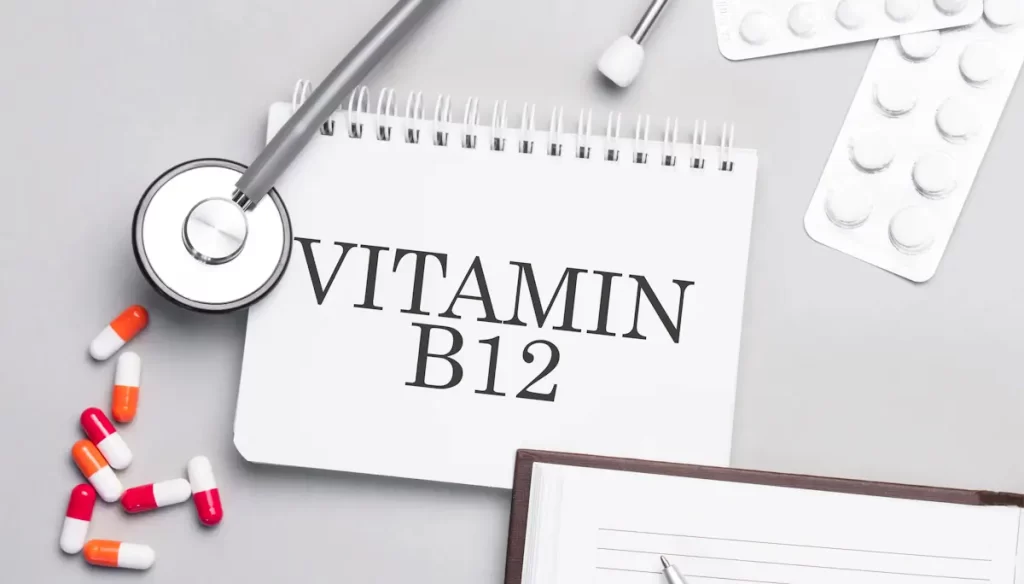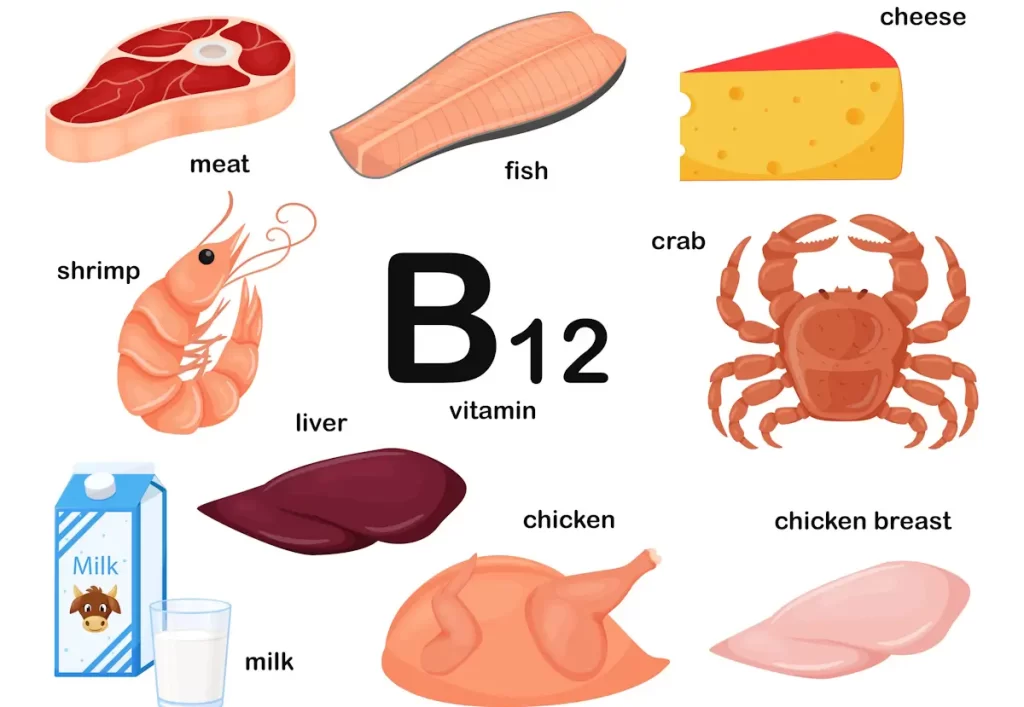Feeling tired or forgetful? You might be low on vitamin B12, a nutrient crucial for energy and brain health. This blog explains its benefits, food sources, and how to manage deficiency.
Thank you for reading this post, don't forget to subscribe!Keep reading to boost your health!
Key Takeaways
- Vitamin B12 is essential for red blood cells, nerve health, energy, and DNA production. Adults need 2.4 mcg daily; pregnant women need 2.6 mcg, while breastfeeding moms require 2.8 mcg.
- Deficiency causes fatigue, memory issues, anemia, and nerve damage. High-risk groups include older adults, vegans, and people with digestive disorders like Crohn’s disease or those on long-term Metformin or PPIs medications.
- Animal-based foods like beef liver (70.7 mcg/3 oz) and clams (17 mcg/3 oz) are rich in B12. Vegans can choose fortified cereals or nutritional yeast (up to 24 mcg/1/4 cup). Supplements are another option for at-risk individuals.
- Early signs of deficiency include pale skin, weakness, numbness in hands or feet, and mood changes like depression due to low serotonin levels tied to B12 shortfalls.
- Managing deficiency includes supplements (1,000–2,000 mcg/day), injections for severe cases or absorption problems and regular blood tests monitoring serum levels below 200–250 pg/mL indicating a deficit risk level
Vitamin B12 Essentials
Vitamin B12 is a key nutrient your body needs for many functions. It helps maintain healthy blood cells, nerves, and energy levels.
Recommended Daily Amounts
Adults need 2.4 mcg of vitamin B12 daily. Babies from birth to six months require 0.4 mcg, while those aged seven to twelve months need 0.5 mcg. Children between one and three years should get 0.9 mcg, increasing to 1.2 mcg for kids four to eight years old.
Pregnant women need slightly more at 2.6 mcg per day, while breastfeeding moms require the highest amount—2.8 mcg daily—for their baby’s health and milk quality. Include fortified foods or supplements if needed, especially in vegan diets or cases of deficiency risk like gastrointestinal disorders or pernicious anemia issues tied to intrinsic factor problems.
Key Functions in the Body
Vitamin B12 plays a big role in DNA synthesis. It helps create red blood cells, which carry oxygen to your body. Low levels can lead to megaloblastic anemia, a condition that makes you feel weak and tired.
This vitamin is also necessary for proper nerve function by supporting myelination—the protective covering around nerves.
It acts as a cofactor for enzymes like methionine synthase and L-methylmalonyl-CoA mutase. These are vital for energy production and maintaining healthy cells. Central nervous system development also depends heavily on it, especially during early life stages.
Without enough B12, issues like cognitive decline or nerve damage may occur over time.
Health Benefits of Vitamin B12
Vitamin B12 helps your body in many ways. It plays a big role in keeping you strong, healthy, and active.
Supports Red Blood Cell Formation and Prevents Anemia
This nutrient plays a big role in making red blood cells. It helps the body make hemoglobin, which carries oxygen through the blood. Without enough of it, your red blood cells can grow too large and become misshapen.
This condition is called megaloblastic anemia. It leads to symptoms like fatigue, weakness, and pale skin.
Blood tests showing serum B12 levels below 200-250 pg/mL often mean deficiency. Low levels may cause serious long-term effects if untreated. The next section will explore how this vitamin protects against birth defects during pregnancy….
Reduces Risk of Major Birth Defects
Vitamin B12 plays a big role in preventing neural tube defects. These are serious birth defects affecting the baby’s brain or spine. Pregnant women need at least 2.6 mcg of vitamin B12 daily to lower this risk.
Low levels of folate combined with B12 deficiency increase these risks further. Adequate intake supports DNA synthesis during early pregnancy, which is critical for proper fetal development.

Supports Bone Health and May Prevent Osteoporosis
Low B12 levels can weaken bones. This increases the risk of fractures and osteoporosis over time. Studies show a strong link between low B12 and poor bone density, especially in older adults.
Maintaining normal levels may protect against these issues.
Adults should aim for 2.4 mcg of B12 daily to support bone health. Animal-based foods like fish, eggs, or fortified breakfast cereals are great sources. Supplements can also help those with dietary restrictions or absorption problems caused by conditions like Crohn’s disease or atrophic gastritis.
Lowers Risk of Macular Degeneration
Vitamin B12 supports eye health by reducing the risk of macular degeneration. Studies show that maintaining adequate levels may help prevent age-related vision loss. Older adults with higher B12 levels often experience better eye function.
B12 lowers homocysteine levels, an amino acid linked to macular damage. Fortified foods and vitamin b12 supplements can boost your intake, especially in vegan or vegetarian diets. This ensures long-term support for healthy vision as you age.
Enhances Mood and Helps Reduce Symptoms of Depression
A lack of vitamin B12 can lead to mood changes and even depressive symptoms. Low levels are linked to higher risks of depression, as this nutrient helps produce serotonin—a chemical that stabilizes mood.
Without enough B12, the brain may struggle to regulate emotions.
Supplementing with vitamin B12 might help improve mood in some people, especially if they have a deficiency. Its effectiveness varies among individuals due to differences in absorption and existing health issues.
People on vegan diets or those with gastrointestinal disorders like Crohn’s disease may be more prone to low levels, increasing their risk of depressive symptoms.
Supports Brain Health and Memory
Low levels of vitamin B12 can harm brain function. This nutrient helps keep neurons healthy and supports cognitive abilities like memory. Studies show that deficiency increases the risk of memory loss and cognitive decline over time.
Vitamin B12 aids in producing serotonin, which impacts mood and mental clarity. Deficiency may raise the chance of clinical depression or confusion. Ensuring proper intake through foods like fish, meat, eggs, or fortified breakfast cereals can protect your brain health as you age.
Essential for Energy Levels
Vitamin B12 plays a big role in keeping your energy up. It helps your body make red blood cells, which carry oxygen to tissues. Without enough oxygen, you may feel weak and tired. Vitamin B12 also supports the central nervous system, aiding DNA synthesis and allowing cells to function properly.
Deficiency can lead to fatigue and trouble focusing. Foods like fortified breakfast cereals, eggs, fish, and meat provide good amounts of this nutrient. Vegans or vegetarians might need supplements or fortified plant-based foods for proper intake.
Regular levels boost mood while supporting cognitive health—and keep you feeling alert throughout the day!
Promotes Healthy Skin, Hair, and Nails
Low levels of vitamin B12 can affect your skin, hair, and nails. It helps in cell production, which keeps these tissues healthy. Deficiency may lead to hyperpigmentation or darker patches on the skin.
Nails might become discolored too.
Changes in hair health are also common with low B12. Hair loss or thinning can occur because it supports strong follicle growth. Boosting intake through foods like fortified breakfast cereals or supplements can improve these issues fast.
Next, explore dietary sources packed with this vital nutrient…

Dietary Sources of Vitamin B12
Vitamin B12 comes from foods like meat, fish, eggs, and dairy products. People on plant-based diets can get it from fortified cereals or supplements.
Animal-Based Foods
Beef liver is one of the richest sources of vitamin B12. A 3-ounce serving, cooked, provides a significant 70.7 mcg, which amounts to 2,944% of your Daily Value (DV). Clams are another excellent option—just 3 ounces offer 17 mcg or 708% DV.
Oysters follow closely with 14.9 mcg per three ounces cooked, giving you about 621% DV.
Tuna is an easy choice too; canned tuna provides around 2.5 mcg in a similar serving size (104% DV). These foods provide great nutrition and ensure high levels of key nutrients like vitamin B12 for supporting red blood cell formation and energy production…
Keep reading to explore plant-based options!
Fortified Plant-Based Foods
Fortified plant-based foods help prevent vitamin B12 deficiency, especially for vegans and vegetarians. Breakfast cereals fortified with B12 are common options. Nutritional yeast is another excellent choice—it contains 8.3–24 mcg of B12 per 1/4 cup, providing up to 1,000% of the daily value (DV).
These foods fill gaps in diets lacking animal products.
Including fortified options ensures proper red blood cell formation and DNA synthesis. Pairing them with other nutrient-rich meals supports overall health. Up next—dietary supplements as another source of vitamin B12!
Dietary Supplements
Dietary supplements provide synthetic vitamin B12. They are especially helpful for vegetarians, vegans, and older adults who may not get enough from food. These supplements come in pills, sublingual forms, or even sprays.
High-dose options, like injections, treat severe deficiencies quickly.
Supplements often help those with digestive issues like Crohn’s disease or atrophic gastritis by bypassing absorption problems. Many fortified breakfast cereals also offer vitamin B12 to boost intake levels easily.
Always check labels to choose reliable sources that meet your daily needs.
Absorption and Bioavailability of Vitamin B12
Vitamin B12 needs a protein called intrinsic factor to be absorbed in the small intestine. Some health issues, like digestive disorders or surgeries, can lower how well your body absorbs it.
Factors Affecting Absorption
Stomach acid helps release vitamin B12 from food. Without enough acid, absorption decreases. Conditions like atrophic gastritis and peptic ulcer disease reduce stomach acid, leading to lower levels of this vital nutrient.
Enzymes in the digestive tract also play a key role in breaking down proteins that bind to vitamin B12.
Binding with intrinsic factor (IF) is critical for proper absorption. This protein, made by the stomach lining, ensures vitamin B12 reaches the ileum, where it is absorbed into the bloodstream.
Calcium supports this process. Medications such as proton pump inhibitors or metformin interfere with both stomach acid production and IF formation—causing deficiencies over time.
Enhancing Vitamin B12 Bioavailability
Absorbing vitamin B12 can be tricky for some people. Taking steps to improve bioavailability ensures your body gets the most from this vital nutrient.
- Consume fortified foods like breakfast cereals and nutritional yeast. These options often provide free-form B12, which is easier to absorb.
- Pair vitamin B12-rich foods with sources of folic acid. This helps in DNA synthesis and better absorption.
- Eat dairy products such as milk or cheese. They have higher bioavailability compared to meat or fish.
- Opt for sublingual vitamin B12 supplements if absorption is a concern. These dissolve under the tongue and bypass the digestive system.
- Treat gastrointestinal disorders like Crohn’s disease or celiac disease promptly. Managing these can improve nutrient absorption overall.
- Space out high intakes of B12 across meals rather than consuming it all at once. Intrinsic factor, needed for absorption, works best within limits (about 1-2 mcg per meal).
- Address low stomach acid caused by conditions like atrophic gastritis or use of H2 blockers, as they hinder proper absorption.
- Check medications like metformin that might interfere with how your body uses vitamin B12 and adjust dosage if possible under medical advice.
- Older adults should consider supplements due to reduced intrinsic factor capacity with age, ensuring their daily needs are met effectively.
- Follow recommended dietary allowances for your age group consistently—2.4 mcg per day for most adults—to maintain balance without exceeding tolerable upper intake levels (UL).
Vitamin B12 Deficiency
A lack of vitamin B12 can lead to serious health problems, affecting energy, memory, and more. Some people may not absorb enough even if they get it from food—this makes awareness crucial.
Signs and Symptoms
Fatigue and pale skin often point to vitamin B12 deficiency. Anemia is common because red blood cell formation slows down. This can leave people feeling weak or dizzy.
Numbness, tingling in hands or feet, and memory issues may arise due to nerve damage. Severe cases can lead to infertility or dementia over time. Weight loss without trying is another warning sign of low vitamin B-12 levels.
Populations at Risk
Some groups face a higher risk of vitamin B12 deficiency. Older adults often struggle with absorption due to atrophic gastritis, which reduces stomach acid needed for digestion. Around 10-30% of people over 50 may have low levels.
Vegetarians and vegans are also at risk since most natural sources come from animal-based foods like meat or dairy. Individuals with gastrointestinal disorders such as Crohn’s disease or celiac disease can’t absorb B12 properly.
Those who’ve had weight loss surgery or take metformin or proton pump inhibitors long-term might experience similar issues too.

Health Consequences of Long-Term Deficiency
Long-term vitamin B12 deficiency can lead to anemia caused by impaired DNA synthesis. This condition, known as megaloblastic anemia, results in abnormal red blood cells that struggle to carry oxygen effectively.
Symptoms often include fatigue, weakness, and pale or yellowish skin.
Neurological problems are another serious consequence. Deficiency may cause nerve damage, leading to numbness or tingling in the hands and feet. Over time, cognitive decline and memory loss may occur—raising concerns about conditions like Alzheimer’s disease.
Low B12 levels also increase the risk of osteoporosis due to weakened bones over time.
Managing Vitamin B12 Deficiency
Managing Vitamin B12 deficiency involves identifying the problem early and finding ways to restore healthy levels. Learn how it can improve your health—read more!
Diagnosis and Biochemical Assessment
Blood tests measure vitamin B12 levels in the body. Levels below 200-250 pg/mL suggest a deficiency. Doctors may also check methylmalonic acid (MMA) and homocysteine levels. High amounts of these can point to low vitamin B12.
Regular monitoring is crucial for high-risk groups like vegetarians, older adults, or those with gastrointestinal disorders such as Crohn’s disease or atrophic gastritis. Early diagnosis helps prevent complications like pernicious anemia and nerve damage.
Treatment Options: Supplements and Injections
Treating vitamin B12 deficiency is simple with supplements or injections. Both work to restore healthy levels and prevent symptoms.
- Vitamin B12 supplements come in pills, lozenges, or sublingual forms. High doses like 1,000-2,000 mcg daily can be effective for many people. These options are ideal for mild cases or those who struggle with dietary intake.
- Injections provide a direct solution by bypassing absorption issues in the stomach. Doctors typically recommend these for severe deficiency or those with conditions like pernicious anemia or celiac disease.
- Nasal sprays containing vitamin B12 offer another option for those who prefer not to take pills or receive shots regularly.
- Patients who cannot absorb B vitamins through food may need lifelong treatment. This ensures their nutrient levels stay balanced.
- Testing before starting any treatment helps diagnose the severity of deficiency and determine the best approach.
- Individuals at risk, such as older adults, people with Crohn’s disease, or vegans, often benefit from regular supplementation to prevent symptoms.
- Regular follow-up blood tests monitor improvement after starting treatment. These check if red blood cells and methylmalonic acid (MMA) levels return to normal ranges.
- For pregnant women, correcting a vitamin B12 deficiency protects against birth defects and supports DNA synthesis during fetal development.
- Over-the-counter supplements are widely available but should only be used under medical guidance—especially if high doses are taken long-term.
- Early intervention avoids complications like nerve damage, cardiovascular events, or megaloblastic anemia caused by prolonged deficiency issues in at-risk groups.
Preventative Strategies
Preventing vitamin B12 deficiency is easier than treating it. Simple changes in diet and lifestyle can help maintain healthy levels.
- Eat foods rich in vitamin B12. Include animal-based options like meat, eggs, fish, and dairy. For example, salmon and beef liver are excellent sources.
- Use fortified foods if you follow a vegetarian or vegan diet. Fortified breakfast cereals and nutritional yeast are great options for plant-based eaters.
- Take supplements if your dietary intake is low or absorption is poor. Sublingual vitamin B12 supplements may improve absorption for some people.
- Regularly check nutrient intakes through blood tests, especially for high-risk groups like older adults or those with celiac disease.
- Treat underlying conditions like Crohn’s disease or atrophic gastritis to enhance absorption of this water-soluble vitamin.
- Limit alcohol consumption as it can harm stomach health and reduce intrinsic factor needed for absorption.
- Discuss medication side effects with your doctor, especially if using metformin or gastric acid inhibitors that impact vitamin B12 levels.
- Pregnant women should meet the recommended dietary allowance (RDA) to avoid birth defects linked to deficiency.
- Educate yourself about signs of pernicious anemia and monitor symptoms like fatigue or tingling hands early on.
- Promote balanced meals during food insecurity by encouraging fortified foods in community programs to prevent cases of deficiency.
Drug-Nutrient Interactions and Vitamin B12
Certain medicines can lower how much vitamin B12 your body absorbs. These interactions might lead to low levels over time, affecting overall health.
Gastric Acid Inhibitors
Proton pump inhibitors (PPIs) block stomach acid production. This helps with conditions like GERD and ulcers. But long-term use can reduce vitamin B12 absorption in the gut. Stomach acid is needed to release B12 from food, making it available for absorption.
Older adults using PPIs face a higher risk of vitamin B-12 deficiency. Low levels over time may lead to fatigue, nerve problems, or even megaloblastic anemia. Regular checks and alternative treatments could help manage this risk effectively…
Now onto Metformin’s impact on Vitamin B12!

Metformin
Metformin, a drug for type 2 diabetes, can lower vitamin B12 levels in the body. This happens because it affects how the stomach absorbs this water-soluble vitamin. Long-term use increases the risk of deficiency.
People on Metformin may feel very tired or experience a pins and needles sensation. Regular blood tests to check serum B12 levels are key. If low levels are found, supplements or injections might help restore balance.
Impact on Absorption and Utilization
Proton pump inhibitors, often used for acid reflux, reduce stomach acid. Low stomach acid can block vitamin B12 absorption. This happens because intrinsic factor, a protein needed for B12 uptake, depends on stomach acid to function properly.
Alcohol misuse further complicates utilization. Chronic use damages the gut lining and impairs haptocorrin secretion—a protein that binds vitamin B12 during digestion. Pernicious anemia also disrupts absorption by limiting intrinsic factor production in the stomach.
These factors increase the likelihood of megaloblastic anemia and related issues over time.
Vitamin B12 in Special Populations
Some groups need more care to maintain healthy Vitamin B12 levels. These include older adults, pregnant women, and people with certain health conditions or specific diets.
Pregnant and Breastfeeding Women
Pregnant women need 2.6 mcg of vitamin B12 daily, while breastfeeding mothers require 2.8 mcg. This water-soluble vitamin plays a key role in DNA synthesis and red blood cell formation—vital for both mother and baby’s health.
A deficiency increases the risk of neural tube defects in babies, impacting their spinal cord development. For breastfeeding women, sufficient B12 is critical for proper brain growth and overall development in infants.
Fortified foods or supplements can help meet these needs, especially for those on a vegetarian or vegan diet.
Older Adults
Older adults absorb less vitamin B12 due to lower stomach acid production. About 38% may have mild deficiencies, increasing the risk of anemia and cognitive issues like memory loss.
Conditions such as atrophic gastritis or pernicious anemia make absorption even harder.
Supplements, injections, or fortified foods like breakfast cereals can help meet needs. Without enough B12, risks for heart disease and Alzheimer’s disease also grow over time. Regular check-ups ensure levels stay healthy.
Individuals with Gastrointestinal Disorders
Gastrointestinal disorders can block the absorption of vitamin B12. Conditions like Crohn’s disease and celiac disease harm the gut lining, making it harder to absorb nutrients. People with atrophic gastritis or those lacking intrinsic factor often face similar issues, leading to cases of vitamin B12 deficiency.
Many individuals in this group rely on supplements or injections for adequate intake. Pernicious anemia, an autoimmune disease, further impacts absorption by attacking cells that produce intrinsic factor.
Regular monitoring and treatment are key for managing this risk effectively.
Vegetarians and Vegans
Vegetarians and vegans often face a higher risk of vitamin B12 deficiency. About 52% of vegans have deficient levels because plant-based foods do not naturally contain this nutrient.
Fortified breakfast cereals, nutritional yeast, and other fortified plant-based options can help meet daily needs.
Supplements are crucial for most people on a vegan diet. Experts recommend taking 50 to 100 mcg of B12 supplements daily to avoid issues like megaloblastic anemia or nerve damage. Regular testing can also ensure levels stay within the recommended dietary allowance (RDA).
FAQs about Vitamin B12
Many people have questions about how Vitamin B12 supports their health and energy. This section answers common concerns, helping you make informed choices for your diet and lifestyle.
Common Questions and Expert Answers
What causes vitamin B12 deficiency? Lack of intrinsic factor, found in people with pernicious anemia or atrophic gastritis, can block B12 absorption. Conditions like Crohn’s disease and celiac disease also interfere with uptake.
Vegans and vegetarians may struggle due to limited plant-based sources unless consuming fortified foods.
How is it treated? Blood tests check levels of methylmalonic acid (MMA) and homocysteine to confirm deficiency. Treatment includes oral supplements, sublingual vitamin B12, or injections for severe cases.
Preventive measures often focus on a balanced diet with fortified breakfast cereals or nutritional yeast.
Conclusion
Vitamin B12 plays a vital role in keeping your body healthy. It supports red blood cells, brain function, and energy levels. You can get it from animal-based foods, fortified products, or supplements.
Managing deficiency early prevents serious health issues. Stay informed and make smart choices for better well-being!
To complement your understanding of essential nutrients, discover the significant health benefits and food sources of Omega-3 fatty acids.
